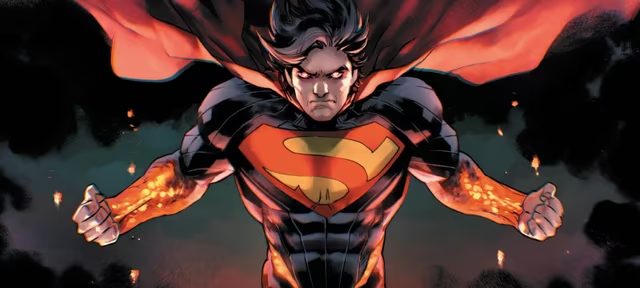If you click on a link and make a purchase we may receive a small commission. Read our editorial policy.
Superman goes to therapy (and it's about time)
Superman may be the most indestructible hero in the DCU, but even he has to be honest about his mental health. Here's how Superman: Lost addresses the pressures of saving the day

Superman may be the Man of Steel but that doesn’t mean he’s completely invulnerable to internal forces that we all endure and struggle to cope with on our own. Bulletproof skin and the ability to leap tall stories in a single bound doesn’t make Clark Kent impervious to stress, heartbreak, depression, or anxiety; his mind is just as complex and susceptible to these pressures as people that don’t have any superpowers. This distinction is at the emotional core of the limited series Superman: Lost by Christopher Priest, Carlo Pagulayan, and Jason Paz, which presents the Man of Tomorrow out of time and out of his element.
Though Superman finds himself back on Earth relatively into the story after a deep-space mission with the Justice League, all isn’t right with him because of his ordeal off-world. With his personal life veering out of control, Superman decides to consult a therapist to help ground him back on terra firma and sort out the internal demons that have been plaguing him recently since his return. Here’s how Superman: Lost speaks to the buried insecurities at the heart of its iconic hero, other instances when Superman’s mental health have been prominently brought into the light, and how this enriches the Superman mythos 85 years since the character made his debut.
Superman’s traumatic odyssey

While investigating a strange device in space with the rest of the Justice League, Superman is suddenly whisked away to the other side of the cosmos without a trace. Fortunately, the superhero makes his return in what seems like minutes to the people of Earth when 20 years have transpired for Superman’s long trek back home to his wife Lois Lane. Though physically appearing relatively unaltered, the prolonged time away from all of his loved ones and the rigors he endured away from Earth, including the temporary loss of his powers, has left Clark a changed man emotionally and psychologically.
At his cousin Kara Zor-El’s suggestion, Superman privately visits her therapist to get at the heart of his mental struggles and the difficulties he has acclimating back to life on Earth. After admitting he has always underestimated Kara and the deep trauma she experienced in losing Krypton while he was a mere infant during the planet’s cataclysmic destruction, Superman gets to the main purpose of his visit. Given how much he has changed since being transported to faraway parts of the universe, Clark has understandably grown apart from his wife, with the couple feeling like strangers to one another.
One of the character traits that Clark confronts throughout Superman: Lost is the idea of his own vaunted sense of pride and self-worth. Though Superman means and does well, as with most depictions of the superhero, he takes from granted how self-important and in the moral superiority that informs his everyday life. Superman: Lost is a story about how the Man of Steel has to deal with not being as powerful as he’s grown accustomed to and facing the harsh truth that he’s not always in the right. It’s a bitter pill for Superman to swallow and, once he does, completely changes how he view himself and his personal relationships back home.
Cries for help from the Man of Steel

Superman stories in the modern era began to show the immense costs of being the most prominent superhero in the DCU really starting with 1986’s Superman: Whatever Happened to the Man of Tomorrow? by Alan Moore and Curt Swan. Intended as the sendoff for the Silver Age Superman who had been appearing in the DCU since the ‘50s, much of Superman’s supporting cast are killed off in a final battle against the hero’s assembled villains. Superman willingly gives up his powers to live an unassuming life as a human with Lois, acknowledging that he was full of himself and informed by a sense of self-importance, preferring to live low-key as a construction worker with his family.
With Superman receiving a more humanistic portrayal in the ‘80s and ‘90s, subsequent stories would similarly explore how Clark is mentally affected by his superhero double life and the coping mechanisms he’s employed to deal with the enormous stress. 1998’s Superman For All Seasons by Jeph Loeb and Tim Sale shows Clark adjusting to relocating to Metropolis, getting a job at the Daily Planet, and saving the day as Superman. After his first harrowing confrontation with Lex Luthor, Clark retreats back to Smallville and temporarily steps away from his costumed alter ego, with his parents Jonathan and Martha consoling him until he returns to Metropolis months later.
One of the more unique takes on Superman taking the time for self-reflection is in 2004’s Superman: For Tomorrow by Brian Azzarello, Jim Lee, and Scott Williams. A cataclysmic event known as the Vanishing causes a million people to suddenly disappear from Earth, including Lois. Superman, who was off-world at the time helping Green Lantern, is haunted by his inability to stop this from occurring and he regularly meets with a priest to express his guilt, providing some of the most frank depictions of Superman addressing his insecurities and displaying his emotional vulnerabilities in any of his comic book appearances.
Saving Superman from himself

What is perhaps Superman’s biggest existential crisis occurs in 2006’s Superman: Up, Up and Away by Geoff Johns, Kurt Busiek, Pete Woods, and Renato Guedes. In the climax to the 2005 crossover event Infinite Crisis, Superman lost his powers after flying through Krypton’s red sun Rao and the kryptonite asteroid belt around it. Up, Up and Away takes place one year later, with Clark still lacking his superpowers and focusing on his career as a journalist and marriage to Lois.
Green Lantern offers Clark the chance to get back in the game as a superhero, going as far as to offer him a custom-made Power Ring. but Clark is unsure whether he wants to take on the responsibilities of being a superhero again. When he and his loved ones are in danger, Clark’s powers begin to resurface and he realizes that, on a certain subconscious level, they are being repressed until he is willing to be Superman again. As Luthor launches his latest plot, Clark must truly ask himself if he wants to be Superman and all the pressures that come with it.
Just because Superman is more powerful than a locomotive doesn’t mean he’s completely invulnerable and as people become more open and honest about addressing mental health, this extends to how we look at our most iconic heroes. Superman is the most iconic and seemingly indestructible of them all, but as the superhero genre ventures into the postmodern, the Man of Tomorrow can provide his own fitting commentary on mental health, especially in holding such a stressful role. Stories Superman: Lost still bring the cosmic action but really puts the mental health discussion at the forefront and are all the more unique and effective for making the Last Son of Krypton as relevant as ever.
On sale now, Superman: Lost #7 is written by Priest, penciled by Carlo Pagulayan and Lee Weeks, inked by Jason Paz and Lee Weeks, colored by Jeromy Cox and Elizabeth Breitweiser, and lettered by Willie Schubert. The story continues in Superman: Lost #8, on sale Nov. 14 from DC Comics.
Follow Popverse for upcoming event coverage and news
Find out how we conduct our review by reading our review policy
Let Popverse be your tour guide through the wilderness of pop culture
Sign in and let us help you find your new favorite thing.
















Comments
Want to join the discussion? Please activate your account first.
Visit Reedpop ID if you need to resend the confirmation email.